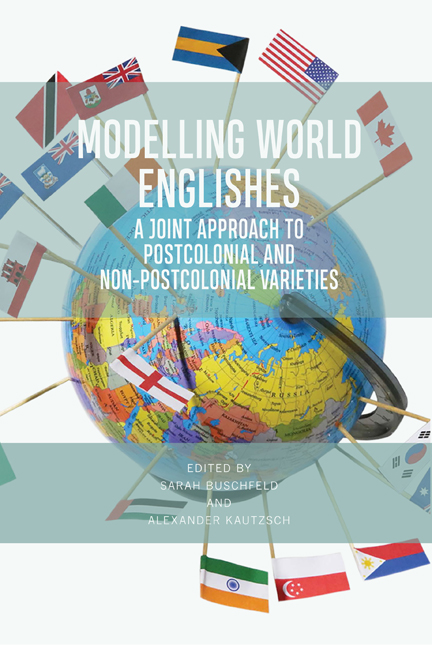Book contents
- Frontmatter
- Contents
- List of Figures and Tables
- List of Contributors
- Foreword
- 1 Introduction
- 2 English in England: The Parent Perspective
- 3 English in Namibia: Multilingualism and Ethnic Variation in the Extra- and Intra-territorial Forces Model
- 4 English in the United Arab Emirates: Status and Functions
- 5 English in India: Global Aspirations, Local Identities at the Grassroots
- 6 English in Singapore: Two Issues for the EIF Model
- 7 English in the Philippines: A Case of Rootedness and Routedness
- 8 English in South Korea: Applying the EIF Model
- 9 English in Japan: The Applicability of the EIF Model
- 10 English in Australia – Extra-territorial Influences
- 11 English in North America: Accounting for its Evolution
- 12 English in The Bahamas and Developmental Models of World Englishes: A Critical Analysis
- 13 Standard English in Trinidad: Multinormativity, Translocality, and Implications for the Dynamic Model and the EIF Model
- 14 Englishes in Tristan da Cunha, St Helena, Bermuda and the Falkland Islands: PCE, non-PCE or both? Blurred Boundaries in the Atlantic
- 15 English in Ireland: Intra-territorial Perspectives on Language Contact
- 16 English in Gibraltar: Applying the EIF Model to English in Non-Postcolonial Overseas Territories
- 17 English in Ghana: Extra- and Intra-territorial Forces in a Developmental Perspective
- 18 Synopsis: Fine-tuning the EIF Model
- Index
1 - Introduction
Published online by Cambridge University Press: 24 September 2020
- Frontmatter
- Contents
- List of Figures and Tables
- List of Contributors
- Foreword
- 1 Introduction
- 2 English in England: The Parent Perspective
- 3 English in Namibia: Multilingualism and Ethnic Variation in the Extra- and Intra-territorial Forces Model
- 4 English in the United Arab Emirates: Status and Functions
- 5 English in India: Global Aspirations, Local Identities at the Grassroots
- 6 English in Singapore: Two Issues for the EIF Model
- 7 English in the Philippines: A Case of Rootedness and Routedness
- 8 English in South Korea: Applying the EIF Model
- 9 English in Japan: The Applicability of the EIF Model
- 10 English in Australia – Extra-territorial Influences
- 11 English in North America: Accounting for its Evolution
- 12 English in The Bahamas and Developmental Models of World Englishes: A Critical Analysis
- 13 Standard English in Trinidad: Multinormativity, Translocality, and Implications for the Dynamic Model and the EIF Model
- 14 Englishes in Tristan da Cunha, St Helena, Bermuda and the Falkland Islands: PCE, non-PCE or both? Blurred Boundaries in the Atlantic
- 15 English in Ireland: Intra-territorial Perspectives on Language Contact
- 16 English in Gibraltar: Applying the EIF Model to English in Non-Postcolonial Overseas Territories
- 17 English in Ghana: Extra- and Intra-territorial Forces in a Developmental Perspective
- 18 Synopsis: Fine-tuning the EIF Model
- Index
Summary
THE MODEL OF EXTRA- AND INTRA-TERRITORIAL FORCES (EIF)
Powerful and innovative World Englishes theorizing should factor in ongoing developmental processes and aim at explanations for the blurring between major variety types such as ESL (English as a Second Language) and EFL (English as a Foreign Language), or ENL (English as a Native Language) and ESL. To capture current linguistic realities, we believe that it is necessary to jointly approach postcolonial and non-postcolonial settings in which varieties of English have been emerging.
A multitude of forces and factors operating on many varieties, to different extents and maybe also at different times, have been described and addressed for postcolonial Englishes (PCEs): for example, issues such as language policies, language in education, attitudes towards English, English and identity, and language in use, to name but a few. Structural linguistic properties and features of PCEs have been identified and interpreted as results of such forces.
In non-postcolonial territories, the spread and depth of entrenchment of the English language are often determined by the very same factors. Yet, they have traditionally been analyzed and located in a different framework, namely as learner or EFL varieties. Though Kachru’s (1985) Three Circles Model is an early acknowledgment of these Englishes, they have been largely neglected by World Englishes theorizing. Despite the fact that Sridhar and Sridhar (1986) issued an early call for an integrated approach to ESL and EFL varieties, it has long gone largely unheard. In recent times, however, this potential interface has experienced renewed research interest, especially by World Englishes researchers (e.g. Buschfeld 2011, 2013; Laporte 2012; Nesselhauf 2009 and the edited volume by Mukherjee and Hundt, eds. 2011) – and with good reason: against the backdrop of recent linguistic realities, such strict separation has turned out to be untimely, if not inadequate. Colonization is, of course, a strong predictor for second-language variety status; however, second-language varieties did not emerge to the same degree of entrenchment and local restructuring in all countries with a colonial past (e.g. Schneider's case study of Tanzania [2007: 197–199] and the cases of Tswana English [Gilquin and Granger 2011] and English in Cyprus [Buschfeld 2013]).
- Type
- Chapter
- Information
- Modelling World EnglishesA Joint Approach to Postcolonial and Non-Postcolonial Varieties, pp. 1 - 15Publisher: Edinburgh University PressPrint publication year: 2020



